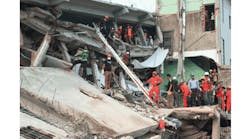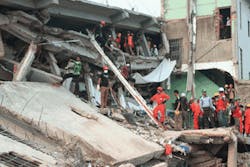Bangladesh: CSR Audits Fail to Protect Workers and Threaten OSH Profession's Integrity
Fire-safety, building-integrity and worker-health and -safety audits conducted by international clothing retailers of garment factories in Bangladesh – and elsewhere – have been a spectacular failure resulting in the deaths of hundreds of poorly paid women garment workers.
These audits – whether done in-house or by third-party monitors under the international brands' "corporate social responsibility" (CSR) programs – also threaten the integrity and reputation of the occupational health and safety profession as it is being drawn into certifying factory death-traps as being "compliant" with national and international standards.
The workplaces at both recent Bangladeshi disaster incidents – Rana Plaza, where 1,129 workers died in the building collapse in April and Tazreen Fashion, where 112 workers burned to death last November –repeatedly had "passed" audits by the brands and third-party monitors.
CSR auditing – which now is involving more and more OHS professionals and consulting firms – has become a global $80 billion dollar business in its own right. To maximize profits, the CSR monitoring firms depend on low-paid, lightly trained inspectors who spend short amounts of time in the facilities, ticking off items on a standardized checklist, so that they rapidly can move on to the next plant and increase the auditors' accounts-payable invoices. Often, the CSR consultants themselves subcontract out the audits to local companies, many without qualified inspectors but with ties to local manufacturers.
The international brands need positive reports of conditions; the finding of a few minor problems, or notification of bigger problems that now have been resolved. The for-profit consulting companies providing these CSR audits have every incentive – if they want to keep their clients in a very competitive market – to provide monitoring reports that meet their clients' needs.
Audits or Revenue Generation?
Some CSR firms have discovered the real money is in charging to train other inspectors, who will conduct the actual on-site visits. Social Accountability International (SAI) developed its own CSR code – SA 8000 – and makes its money training employees of other companies to certify their clients' plants as "compliant with SA 8000."
In August 2012, the Italian firm RINA Group, using its SAI-trained auditors, gave the Ali Enterprises garment plant in Karachi, Pakistan, a clean bill of health and an SA 8000 certification. Three weeks later, 258 workers were killed in a fire in which workers were trapped behind locked doors and barred windows after damaged electrical systems ignited improperly stored flammable materials in the "SA 8000-certified" factory.
A similar incident happened with Occupational Health and Safety Management System 18000 (OHSMS 18000) certifications issued by for-profit, third-party auditors. In March 2012, the Fair Labor Association (FLA) conducted inspections of three Chinese factories operated by Apple-supplier Foxconn. The FLA inspectors noted that the Fu Tai Hua factory in Shenzhen had received an OHSMS 18000 certification – reportedly awarded by consulting firm SGS – despite having a management-only health and safety committee that never met, conducted no inspections, investigated only a handful of accidents, included no worker participation and had no lockout/tagout program or adequate hazard-communication program in highly mechanized factory using numerous hazardous chemicals.
Undermining all of the global retailers' CSR programs is a supply chain business model that places absolute priority on the brands' "iron triangle" of the lowest price/the highest quality/the fastest delivery from contractors. At the same time, contractors are provided with ever-shrinking, razor-thin profit margins by the brands, and government regulations are made meaningless by corruption and lack of resources. Garment workers are so desperate for work that they cannot refuse any job, no matter how dangerous.
Moreover, the people with the greatest knowledge of the daily hazards on the job and the greatest stake in safe conditions who could make a real difference if provided with training and the authority and opportunity to act – the factories' workers – have been excluded from any meaningful roles in ongoing plant health and safety programs.
Until the inherent contradictions of the current global supply chain model are recognized and eliminated – and until informed and genuinely empowered workers are at the center of plant-floor safety and health programs – workers will continue to die completely preventable deaths unprotected by public-relations exercises in CSR codes, audits and promises.
Garrett Brown, MPH, CIH, conducts workplace health and safety inspections for the state of California. The views expressed here are his own and not in any way those of the state of California.

